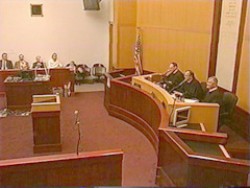 Judges Steven M. Colloton, Michael J. Melloy and Duane Benton hear oral arguments at Drake. |
Drake law students packed the courtroom of the Neal and Bea Smith Law Center on Nov. 1 to watch oral arguments heard before the U.S. Court of Appeals for the 8th Circuit. The court, which is immediately below the U.S. Supreme Court, last held hearings at Drake in 2004.
A three-judge panel heard arguments in two cases. The first involved a woman convicted of homicide who is seeking a review of the Parole Board’s decision to deny her an annual review following a change in the Iowa Code. The second case dealt with a company appealing a District Court decision in favor of a former employee who made an age-discrimination claim. Two Drake Law School alumni, Frank Harty, LW’84, and Michael Carroll, LW’89, appeared before the court in the discrimination case.
The court took both cases under advisement. Immediately following the hearings, students asked questions of the judges as well as some of the attorneys.
“It was an interesting experience and well appreciated,” said Michael Schuchat, a first-year student from West Des Moines. “It showed me what I might be doing later in my career. This gave us a chance to see what trial law is like.”
“It was a great opportunity for students to ask questions,” said John Edwards, associate dean for information resources. “I think the insights of the judges are important. The judges were candid and told the students what attorneys need to do to be well prepared for court. It is beneficial for the students to see a live argument in a court just below the U.S. Supreme Court.”
During the question-and-answer session, one student asked the judges, “How much of your mind is made up before you hear the case?”
“Richard Arnold kept a survey of whether a judge leaned one way or the other before a case,” said Judge Duane Benton of Kansas City, “and 16 percent said they changed the way they were leaning after hearing the arguments.”
“I would have said the same thing,” said Judge Michael Melloy of Cedar Rapids. “At the end of the day you win or lose the case in the briefs. A lot of times you can take the case with the brief.”
Another student followed up with the question: “What makes a good brief?”
“Good briefs have in them the best arguments,” replied Judge Steve Colloton of Des Moines. “Don’t put in 10 arguments if two or three might win. It is helpful to pick out facts that are central to your argument.”
“Let us know the facts that support your case and tell us what the law is,” added Judge Melloy.
Judge Benton offered another piece of advice: “Be very honest with yourself and what the real legal issue is.”
One student asked what impact oral arguments have when the percentage of judges who change their minds is quite small.
“The judges come into the oral argument with questions on their mind and generally ask those questions,” Judge Melloy said. “Be prepared to answer the judge’s questions. The argument is least helpful if the judge doesn’t ask any questions. Don’t be offended by questions, but answer them and be straightforward with the answers.”

